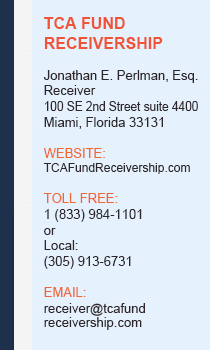| |
1. What is a Receiver?
A Receiver is an individual appointed by the Court, in this case the United States District Court for the Southern District of Florida, to serve as a neutral party to assume control over a business that is the subject of a federal lawsuit. The Receiver takes possession of all assets of the Receivership Entities, as directed by the Court, provides an accounting to the court, and may ultimately establish a procedure whereby consumers and others submit claims which may result in a court-approved distribution.
2. Who is Jonathan Perlman?
Jonathan Perlman is a shareholder of the Genovese Joblove & Battista law firm, and directs the Firm’s securities and class action litigation practice groups. He graduated from Duke University (cum laude) and the University of Florida College of Law and has been practicing law in South Florida for over 25 years. He is “AV” rated by Martindale-Hubbell. He has been recognized as a “Florida Super Lawyer” and “Top Lawyer” in securities by Law & Politics and the South Florida Legal Guide, respectively, as well as a “Legal Eagle” by Franchise Times recognizing the top 100 U.S. franchising attorneys, and is a board member and co-chair of the Best Practices Committee of the National Association of Federal Equity Receivers.
Mr. Perlman also served as court-appointed Receiver over entities that perpetrated a multi-million-dollar Ponzi-scheme, in SEC v. Creative Capital Consortium, LLC, et al., Case No. 08-cv-81565-DTKH (S.D. Fla.). Mr. Perlman is also the court-appointed Receiver over Hispanic Global Way and affiliates, companies that advertised and sold weight loss products using deceptive and unfair means, in the case FTC v. Hispanic Global Way et al., Case No. 14-cv-22018-CMA (S.D. Fla.) and over 321 Loans, affiliates and companies that engaged in fraudulent and unfair deceptive practices relating to debt relief programs and services in the case FTC v. Marcus, et al., Case No. 17-cv-60907-FEM (S.D. Fla.).
3. Who does the Receiver work for?
The Receiver acts as an officer of the Court. The Receiver cannot provide investors, creditors, or other interested parties with legal advice. The beneficiaries of the Receiver’s work include the investors who gave monies to the Receivership Entities. The Receiver acts in the interests of all investors and creditors by identifying and taking control of all assets as quickly as possible and performing such duties as the Court directs. In the event you have a specific question regarding your legal rights, you should contact an attorney.
4. Am I getting a refund?
Investors and creditors may be eligible for a distribution at the conclusion of the Receivership, subject to the conclusion of the SEC’s pending litigation against the Receivership Entities, and upon the Court’s approval of a distribution process and subject to availability of funds.
5. How do investors and creditors request a distribution or refund?
Please check back on this site at a later date for additional information.
6. When can I expect to receive a distribution?
Due to the nature of this case, it is not possible to determine the exact duration of the action. Notwithstanding the foregoing, the Receiver intends to move as quickly as possible given the circumstances.
7. What legal action is going to be taken against the company?
For progress on the litigation by the Securities and Exchange Commission as well as any litigation actions taken by the Receiver, please check the “Court Documents” posted on this website.
8. Is there anything consumers need to do at this time?
Currently, the Receiver is undertaking the investigation of the Receivership Entities, including a review of the books and records of the Receivership Entities. Should the need arise; employees and other interested persons will be notified of any required action through this website. |







